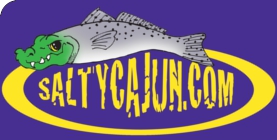Quote:
Originally Posted by Duck Butter

If people in Louisiana start to specifically target sheephead at a much broader scale then YES, but as of now that isn't the case.
Tripletail on the other hand are really starting to be specifically targeted at a much broader scale, so regulations are being LOOKED into. Nothing has been set as of yet.
We must all remember that the same thing happened to redfish, they took some serious hits when the blackened redfish 'craze' swept through. Regs had to be set to keep the species in balance (and I am very thankful for that).
Yellowfin tuna stocks had to be assessed as well as they are at an all-time popularity right now. They once were rarely targeted, and were considered nuisance fish when trolling for other 'more desirable' species. My have things changed, and fisheries managament has to change with it as well as regulations
|
The burden to provide sound scientific support should always be on those suggesting increased regulation.
A Constitutional Republic is based on the idea that the liberty of individuals should only be restricted in cases of demonstrated necessity. The position that tighter limits are always good conservation is not only bad science, it is contrary to the ideas of liberty that the framers of our Constitution sought to preserve.
Copying other states is rarely sound science based wildlife management. Asserting the sexual maturity of a fish as the basis for a minimum length limit is not scientific management. For example, it has been shown and is well known that the sexual maturity of redfish is actually a good cause to restrict harvest of sexually mature fish.
Restrictions on liberty (tighter limits) that carry criminal penalties should be supported with good science, including stock assessments, condition indices, and understanding the role of the species in the overall food web.
The debacle with red snapper is actually endangering other species because the Draconian restrictions on red snapper are allowing them to become overpopulated in some areas to the detriment of their food sources and to the harm of other species that red snapper compete with for food and habitat.
Overly restrictive harvest limits is not good conservation. Good conservation allows sustainable harvests to prevent overpopulation for the benefit of the overall habitat and food web.
You need more than anecdotal evidence that a given species is being targeted to justify making current practices a crime. You need valid scientific data showing that current harvest levels are not sustainable. This requirement has two components:
1. You need to accurately determine what current harvest levels actually are.
2. You need to accurately assess current population levels and food web dynamics to show that the current harvest levels are not sustainable and would lead to a long term decline in the resource.






